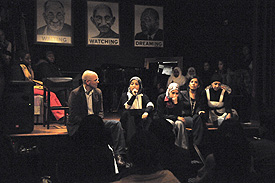In front of the veil
Photograph courtesy May Yu
The writer of The Hijabi Monologues, Sahar Ullah, AM’07, tells stories to overcome prejudice. As a Muslim American who wears hijab, the veil donned by some Muslim women, she has experienced her share of snap judgments. ”People think maybe our fathers are making us do this, and we’re oppressed; we aren’t really interested in studying; we don’t have any goals.”
 The show’s founders (including Ullah, speaking) and Al-Arian (center) lead a post-show workshop.
The show’s founders (including Ullah, speaking) and Al-Arian (center) lead a post-show workshop.To combat these and other preconceptions about Muslim American women, with help from Dan Morrison and Zeenat Rahman (both AM’06), Ullah wrote her own stories and collected others, forming them into a performance piece.
Although all the characters wear the Islamic veil, the monologues have little to do with hijab. “It’s never a centerpiece of any of the stories,” like the female sexual organ is in The Vagina Monologues, says Ullah, in Cairo through May 20 taking an intensive course in Arabic. “There’s never a monologue that says, ‘My hijab is angry.’ ‘My hijab wears a skirt.’”—R.E.K.
In the beginning We were in the car, and Dan was driving, and there were four Muslim girls in the car in hijab. He parks the car, looks back, and says, “Oh my God, we’re gonna get arrested.” And then I said, “Well, actually, I have a story about that.” And he just stopped, and he said, “You know what? We need a Hijabi Monologues.” And that’s how it started.
Sense of decency I wear [hijab] because I believe that it’s a religious duty. I have a certain sense of what I feel comfortable showing, so if I were to walk out without my hijab, it’d be like walking out without a T-shirt on.
One woman’s story [Former U of C master’s student] Leena Al-Arian’s father was in prison, a high-profile case, so she grew up with the media always in their faces. He got arrested right after 9/11, and he’s been released, but I told Leena, it’d be really great to get your story, but I don’t want the facts of the case. For a lot of people, when they go through traumatic experiences, they put on this solid mask. And a lot of people, when they hear facts, miss the point that these are human beings experiencing this. So I said, “Let’s talk about what you felt as a young girl when the FBI came into your home, because this is an experience that other Muslims are going through.”
Open mike, limited time We never do one story. One of the major points of the project is that you can’t generalize, just see a scarf on somebody’s head and think, I know that woman. Or if a woman doesn’t wear a scarf, I know that woman—you can’t say what she’s thinking, what she’s feeling, her experiences.
Ten performances—and counting We’ve been getting a lot of requests. We’re hoping when I come back [from Cairo], we can reconnect with those people who are contacting us, visit their communities, and help them start a local chapter.
I’m OK, you’re OK People see themselves in the stories being told. There was one woman, an African American Muslim woman in LA, who came up to me afterward and said, “You know, this was really therapeutic.” And I understood exactly what she was saying. It’s like, you can just breathe.
